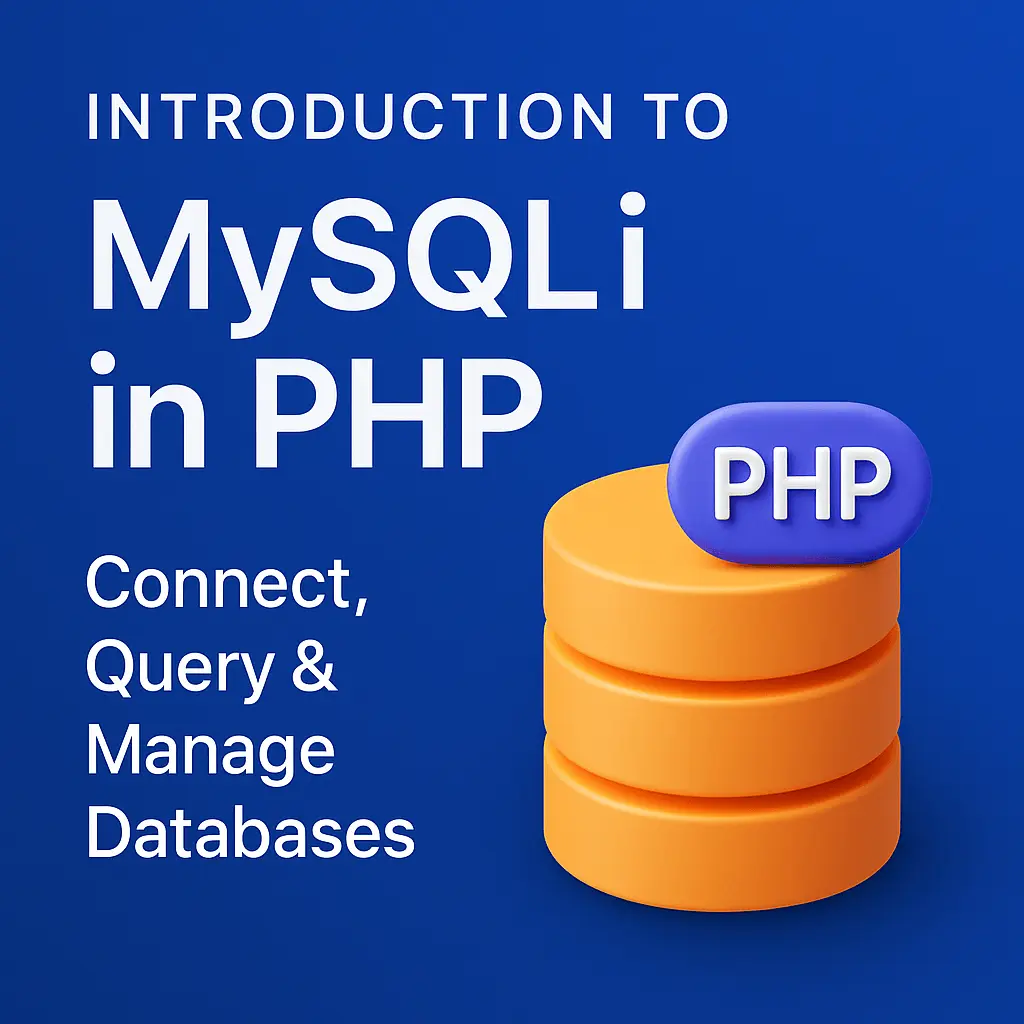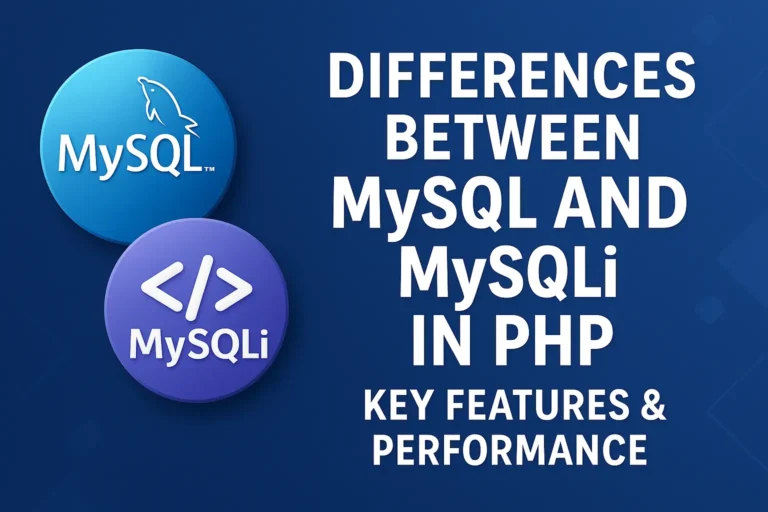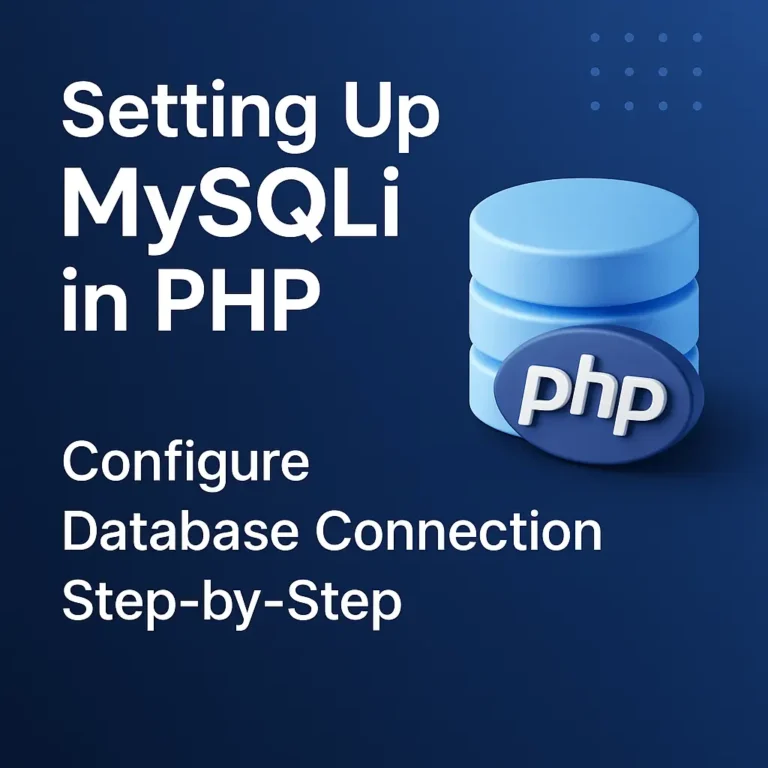In this article, we will delve into the definition of MySQLi, explore its key features, and provide code examples to demonstrate its usage.
What is MySQLi?
MySQLi is an improved extension of the MySQL database driver for PHP, designed to take advantage of newer functionalities and provide a more robust and flexible way to interact with MySQL databases. It was introduced with PHP 5.0, providing a more secure and efficient method to connect, query, and manage MySQL databases.
Key Benefits of MySQLi:
Object-Oriented and Procedural Interface: MySQLi supports both object-oriented and procedural programming styles, giving developers flexibility in how they write their code.
Prepared Statements: Enhanced security against SQL injection attacks by using prepared statements.
Multiple Statements: Ability to execute multiple queries in a single call.
Enhanced Debugging: Improved error handling and reporting.
Support for Transactions: Better control over database operations with transaction support.
Features of MySQLi
1. Dual Interface: Object-Oriented and Procedural
MySQLi allows developers to choose between object-oriented and procedural programming styles. This flexibility makes it easier to integrate into existing codebases and align with the coding practices preferred by individual developers or teams.
Object-Oriented Example:
$mysqli = new mysqli("localhost", "user", "password", "database");
if ($mysqli->connect_error) {
die("Connection failed: " . $mysqli->connect_error);
}
echo "Connected successfully";
$mysqli->close();
Procedural Example:
$mysqli = mysqli_connect("localhost", "user", "password", "database");
if (!$mysqli) {
die("Connection failed: " . mysqli_connect_error());
}
echo "Connected successfully";
mysqli_close($mysqli);
2. Prepared Statements
Prepared statements are a powerful feature of MySQLi that enhance security and performance. They allow you to execute the same query multiple times with different parameters, reducing the risk of SQL injection and optimizing query execution.
Prepared Statement Example:
$mysqli = new mysqli("localhost", "user", "password", "database");
if ($mysqli->connect_error) {
die("Connection failed: " . $mysqli->connect_error);
}
$stmt = $mysqli->prepare("SELECT id, name FROM users WHERE email = ?");
$email = "user@example.com";
$stmt->bind_param("s", $email);
$stmt->execute();
$stmt->bind_result($id, $name);
while ($stmt->fetch()) {
echo "ID: $id, Name: $name\n";
}
$stmt->close();
$mysqli->close();
3. Multiple Statements
MySQLi supports executing multiple SQL queries in a single call. This can improve performance by reducing the number of round trips between the PHP script and the database server.
Multiple Statements Example:
$mysqli = new mysqli("localhost", "user", "password", "database");
if ($mysqli->connect_error) {
die("Connection failed: " . $mysqli->connect_error);
}
$sql = "INSERT INTO users (name, email) VALUES ('John Doe', 'john@example.com');";
$sql .= "INSERT INTO users (name, email) VALUES ('Jane Doe', 'jane@example.com');";
if ($mysqli->multi_query($sql)) {
do {
if ($result = $mysqli->store_result()) {
while ($row = $result->fetch_row()) {
printf("%s\n", $row[0]);
}
$result->free();
}
} while ($mysqli->next_result());
} else {
echo "Error: " . $mysqli->error;
}
$mysqli->close();
4. Enhanced Debugging
MySQLi provides improved error reporting and debugging capabilities, making it easier to identify and resolve issues in your database interactions.
Enhanced Debugging Example:
$mysqli = new mysqli("localhost", "user", "password", "database");
if ($mysqli->connect_error) {
die("Connect Error (" . $mysqli->connect_errno . ") " . $mysqli->connect_error);
}
if (!$mysqli->query("INSERT INTO non_existing_table (name) VALUES ('Test')")) {
echo "Error: " . $mysqli->error;
}
$mysqli->close();
5. Support for Transactions
Transactions are essential for ensuring data integrity and consistency, especially in complex applications that require multiple related operations to be executed as a single unit of work. MySQLi provides robust support for transactions.
Transaction Example:
$mysqli = new mysqli("localhost", "user", "password", "database");
if ($mysqli->connect_error) {
die("Connection failed: " . $mysqli->connect_error);
}
$mysqli->autocommit(FALSE);
try {
$mysqli->query("INSERT INTO accounts (user_id, balance) VALUES (1, 1000)");
$mysqli->query("UPDATE accounts SET balance = balance - 100 WHERE user_id = 1");
$mysqli->query("UPDATE accounts SET balance = balance + 100 WHERE user_id = 2");
$mysqli->commit();
echo "Transaction completed successfully";
} catch (Exception $e) {
$mysqli->rollback();
echo "Transaction failed: " . $e->getMessage();
}
$mysqli->close();
Conclusion
MySQLi is a powerful and flexible extension for PHP developers working with MySQL databases. Its support for both object-oriented and procedural programming styles, along with features like prepared statements, multiple statements, enhanced debugging, and transaction support, make it an essential tool for modern web development.
By leveraging MySQLi, developers can build secure, efficient, and robust database-driven applications. Whether you are a beginner or an experienced developer, understanding and utilizing the capabilities of MySQLi can significantly enhance your PHP development skills and the quality of your applications.






